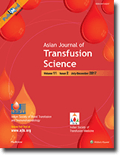
Asian Journal of Transfusion Science
Scope & Guideline
Fostering collaboration in the heart of transfusion science.
Introduction
Aims and Scopes
- Transfusion Medicine Research:
The journal publishes original research on various aspects of transfusion medicine, including but not limited to blood component therapy, transfusion reactions, and innovative transfusion practices. - Quality Management in Blood Services:
A consistent focus on quality improvement strategies in blood banks and transfusion services, including audits, risk management, and compliance with international standards. - Hematological Disorders and Transfusion:
Research addressing the intersection of hematological conditions, such as sickle cell disease and thalassemia, with transfusion practices and outcomes. - Immunohematology and Blood Group Antigens:
Exploration of blood group antigens, antibody profiles, and their implications in transfusion compatibility and hemolytic disease. - Patient Blood Management (PBM):
Studies aimed at optimizing patient outcomes through evidence-based transfusion practices, minimizing unnecessary transfusions, and promoting alternatives. - Epidemiology of Transfusion-Transmitted Infections:
Research on the prevalence of infectious agents in blood donors and the impact of these infections on blood safety and transfusion practices.
Trending and Emerging
- Impact of COVID-19 on Transfusion Practices:
There is a notable increase in publications addressing the implications of the COVID-19 pandemic on blood donation, transfusion safety, and management strategies. - Innovative Techniques in Transfusion Medicine:
Emerging themes include the use of simulation and advanced technologies in transfusion practices, indicating a trend towards integrating modern methodologies into clinical settings. - Patient Blood Management Strategies:
A growing emphasis on patient blood management, highlighting the importance of evidence-based practices to optimize patient outcomes and reduce unnecessary transfusions. - Molecular Typing and Immunohematology Advances:
Recent studies have increasingly focused on molecular typing of blood groups and antibodies, reflecting advancements in precision medicine and personalized transfusion practices. - Quality Improvement and Hemovigilance:
An upward trend in research related to quality management systems and hemovigilance, emphasizing the importance of monitoring and improving transfusion safety.
Declining or Waning
- Traditional Blood Donation Practices:
There seems to be a waning emphasis on studies related to traditional blood donation practices, as the journal shifts towards more innovative strategies and technologies in blood collection and transfusion. - Historical Blood Group Research:
Research focused on historical aspects of blood group systems has decreased, possibly due to the increasing relevance of genetic and molecular typing techniques. - Non-Clinical Aspects of Blood Donation:
Topics addressing non-clinical factors influencing blood donation, such as donor motivation and education, appear to be less frequently published, suggesting a shift towards more clinically oriented research.
Similar Journals
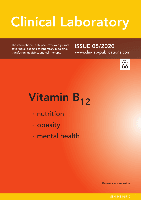
Clinical Laboratory
Fostering Collaboration in Clinical Laboratory PracticesClinical Laboratory is a reputable journal dedicated to the interdisciplinary field of clinical biochemistry, genetics, and molecular biology. Published by CLIN LAB PUBL in Germany, this journal provides a platform for the dissemination of original research, reviews, and key insights into laboratory practices and innovations that play a crucial role in modern medicine and diagnostics. With an ISSN of 1433-6510 and a consistent publication history since its inception in 1964 and converging through 2024, it is indexed within the Scopus database, ranking in the 30th percentile among its peers. Although classified in the third quartile for 2023 in the field, Clinical Laboratory continues to contribute valuable knowledge and fosters collaboration among researchers, professionals, and students. Notably, it does not currently operate as an Open Access journal, which emphasizes its commitment to maintaining high-quality peer-reviewed content accessible through institutional and library subscriptions. For those in the domain, Clinical Laboratory serves as a vital resource for the latest advancements and trends shaping the future of clinical laboratory science.
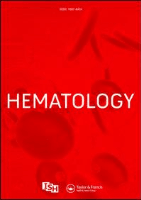
Hematology
Advancing Hematology: Where Innovation Meets InsightHematology is a distinguished open-access journal published by Taylor & Francis Ltd, dedicated to advancing research and knowledge in the field of hematology. Established in 1996, the journal has continually evolved to meet the needs of a growing community of researchers and practitioners, providing a vital platform for disseminating innovative findings and clinical insights. With its impact factor reflecting a robust commitment to quality scholarship, Hematology has achieved a respectable position in its category as evidenced by its Q3 ranking in the Hematology category and ranks #85 out of 137 in the Scopus index, which positions it in the 38th percentile among its peers. The journal’s open-access policy, initiated in 2019, further enhances its reach and accessibility, allowing a broad audience of professionals, researchers, and students to engage with high-quality research without barriers. By covering a wide range of topics related to blood disorders, treatment methodologies, and emerging therapies, Hematology stands as an essential resource for those dedicated to innovation in this critical area of healthcare.

Indian Journal of Hematology and Blood Transfusion
Empowering Healthcare Through Cutting-edge Hematology ResearchIndian Journal of Hematology and Blood Transfusion, published by SPRINGER INDIA, serves as a leading platform for disseminating original research, reviews, and case studies in the field of hematology. With an ISSN of 0971-4502 and E-ISSN 0974-0449, this journal has been instrumental in advancing knowledge from 2000 to 2024, providing insights into critical issues surrounding blood disorders and transfusion practices. Currently ranked in the Q3 category for Hematology for 2023, it reflects a commitment to high-quality scientific content amidst a competitive landscape where it ranks 97/137 in Scopus for Medicine - Hematology, placing it in the 29th percentile of its peers. The journal primarily addresses a diverse readership, including researchers, healthcare professionals, and students, aiming to foster innovation and collaboration within the field. Although it operates under a subscription model, access options for individual articles and institutional subscriptions ensure that valuable research is disseminated widely to enhance medical practice and education in hematology.

Blood Research
Connecting Researchers to Revolutionize Blood HealthBlood Research, published by SPRINGER, is a premier journal dedicated to the multifaceted realm of hematology, serving as a crucial platform for disseminating innovative research findings and advancements in the diagnosis and treatment of blood-related disorders. With an ISSN of 2287-979X and an E-ISSN of 2288-0011, this journal is recognized for its commitment to scholarly excellence and impact in the field, currently holding a reputable Q2 ranking in the Hematology category as per the 2023 metrics. The journal spans from 2013 to 2024, providing a broad archive of quality research that is vital for researchers, healthcare professionals, and students alike. Although it is not an Open Access journal, it offers insightful contributions that enhance the understanding of hematological science, fostering the exchange of knowledge crucial for advancing patient care and clinical practices globally. The journal’s performance is underscored by its Scopus ranking in the 46th percentile, reflecting its significant role in the ongoing discourse in hematology.
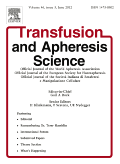
TRANSFUSION AND APHERESIS SCIENCE
Transforming Transfusion Practices with Cutting-edge ResearchTRANSFUSION AND APHERESIS SCIENCE, published by Pergamon-Elsevier Science Ltd, serves as a pivotal platform for researchers and practitioners in the fields of hematology, transfusion medicine, and apheresis. With an ISSN of 1473-0502 and an E-ISSN of 1878-1683, this peer-reviewed journal boasts a respectable Q3 ranking in the Hematology category as of 2023, positioning it within the 45th percentile among its counterparts. Operating from the United Kingdom, it provides comprehensive insights into the latest advancements and methodologies in transfusion practices and apheresis technology, crucial for enhancing patient care and therapeutic strategies. The journal's scope, covering key developments from 1996 to 2024, allows for a deep exploration of historical and emerging trends within the discipline. Moreover, its open access options facilitate widespread dissemination of research findings, fostering collaboration and innovation in the scientific community. For those dedicated to advancing knowledge in hematology, TRANSFUSION AND APHERESIS SCIENCE represents an essential resource, bridging theory and practice in this vital area of healthcare.

BLOOD REVIEWS
Exploring breakthroughs in hematologic and oncologic research.BLOOD REVIEWS is a highly regarded journal published by Churchill Livingstone, specializing in the fields of Hematology and Oncology. With an impressive Q1 ranking in both disciplines and placing in the top 10% of its peer categories according to Scopus metrics, it provides an essential platform for the dissemination of cutting-edge research and reviews pertaining to blood disorders and cancer treatment. Since its inception in 1987 and continuing through 2024, the journal has established itself as a cornerstone for healthcare professionals, researchers, and students who seek to advance their understanding of hematologic and oncologic topics. While not an open-access journal, BLOOD REVIEWS retains a reputation for delivering high-quality, peer-reviewed articles that foster dialogue and innovation within the scientific community. For those in the United States and beyond, the journal serves as a vital resource, housed at the Journal Production Department in Edinburgh, Scotland, ensuring accessibility and a global reach in its critical academic contributions.
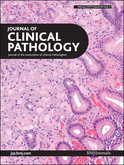
JOURNAL OF CLINICAL PATHOLOGY
Bridging Laboratory Discoveries with Patient CareJOURNAL OF CLINICAL PATHOLOGY, published by BMJ PUBLISHING GROUP, stands at the forefront of advancements in the field of clinical pathology, offering a platform for groundbreaking research and insights from 1948 to the present. With an impressive impact factor and categorized as Q1 in both Medicine (miscellaneous) and Pathology and Forensic Medicine for 2023, the journal holds a distinguished position in the academic community, ranking 22nd out of 208 journals in its category on Scopus and representing the 89th percentile. While the journal does not currently offer open access, it remains a vital resource for researchers, healthcare professionals, and students seeking to stay current with innovative methodologies, clinical techniques, and diagnostic advancements. Located in London, United Kingdom, the journal aims to bridge the gap between laboratory findings and clinical practice, emphasizing the importance of evidence-based pathology in improving patient care and treatment outcomes. Engage with the JOURNAL OF CLINICAL PATHOLOGY to enhance your understanding and contribute to the evolving landscape of clinical pathology research.
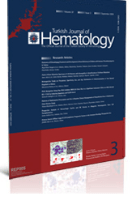
Turkish Journal of Hematology
Fostering collaboration in hematology research and clinical practice.Turkish Journal of Hematology is an esteemed publication dedicated to advancing the field of hematology, producing influential research since its inception in 1999 under the auspices of GALENOS PUBL HOUSE. With an Open Access model, it facilitates widespread dissemination of knowledge, allowing researchers, clinicians, and students to stay abreast of the latest developments in blood disorders and treatments. With an ISSN of 1300-7777 and an E-ISSN of 1308-5263, the journal holds a commendable position in the academic community, evidenced by its 2023 Q3 ranking within the hematology category and its standing at #80 out of 137 in the Scopus database, placing it in the 41st percentile. Covering a wide scope of topics within hematology, this journal serves as a critical resource for disseminating innovative research and clinical practices pertinent to the ongoing challenges faced in this vital area of medicine. With its continuous publication until 2024, Turkish Journal of Hematology remains a beacon for enhancing the understanding and treatment of hematological conditions within the Turkish and global medical communities.
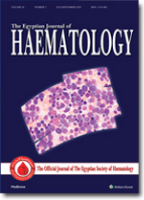
Egyptian Journal of Haematology
Exploring Breakthroughs in Blood Health and DiseaseThe Egyptian Journal of Haematology, published by WOLTERS KLUWER MEDKNOW PUBLICATIONS, stands as a pivotal resource in the field of hematology, particularly within the context of Egypt and the broader Middle Eastern region. This journal is dedicated to disseminating high-quality research that explores the latest advancements in blood disorders, hematologic malignancies, and transfusion medicine. With a focus on original research, case studies, and reviews, it aims to provide a comprehensive platform for hematologists, researchers, and healthcare professionals to enhance their understanding and management of hematological conditions. Although it is not an open-access journal, the rigorous peer-review process ensures that only the most impactful studies are published, contributing to the journal's reputation in the academic community. The Egyptian Journal of Haematology serves as an essential tool for advancing knowledge, improving clinical outcomes, and fostering collaboration among experts in the field.
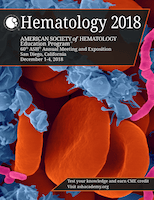
Hematology-American Society of Hematology Education Program
Unlocking Insights for Hematology ProfessionalsHematology-American Society of Hematology Education Program is a premier peer-reviewed journal dedicated to advancing the field of hematology through comprehensive educational content. Published by the American Society of Hematology, this journal plays a crucial role in disseminating knowledge to researchers, clinicians, and students in hematology and related disciplines. With an impressive Q1 status in the field, it ranks among the top journals at the forefront of hematological research, as evidenced by its 60th percentile ranking in Scopus' Medicine - Hematology category. Although it does not offer open access, the journal provides invaluable insights and educational resources from leading experts, focusing on the latest advancements, treatment protocols, and evolving understanding of blood disorders. Covering a wide range of topics, from basic research to clinical applications, this journal is essential for anyone seeking to deepen their expertise and stay informed on the latest developments in hematology. For further engagement, readers can access insightful articles published since 2001, ensuring a rich repository of knowledge for ongoing research and clinical excellence.